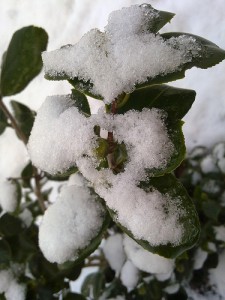 Gardening is often thought of as a summer pastime, but don’t forget that your beautiful garden needs winter TLC. In order to have an optimal set-up for spring planting, it’s important to take steps to winterize both your garden bed and the plants that plan to weather the season.
Gardening is often thought of as a summer pastime, but don’t forget that your beautiful garden needs winter TLC. In order to have an optimal set-up for spring planting, it’s important to take steps to winterize both your garden bed and the plants that plan to weather the season.
Insulate
While some plants die every winter, others go into a dormant phase. Protect these perennials by insulating them. For fruits and vegetables, consider covering them with a pile of clean straw. Roses and other plants can be covered with mulch or piles of leaves. Protecting soil with a thick layer of mulch is also a wise idea to help keep temperatures near the roots consistent during the winter months.
Guard and protect
Young plants are the most at jeopardy for dying in the winter months. Protect tree trunks or low-lying branches from animals interested in feasting on the bark by wrapping wiring or other protective materials around them. Fencing can also be put up around flowerbeds to help keep unwanted intruders out. Once snow has arrived, keep delicate branches and plants like evergreens safe from the weight of the snow by gently knocking it off the branches.
Harvest
Some plants can still be harvested during the winter months. Carrots, kale and other similar plants that grow deep in the soil will still require attention during the colder months if they’re not buried beneath deep snow.
Bring it indoors
Potted plants can require transfer inside. Avoid overwatering and make sure they receive plenty of sunlight indoors to flourish through the colder months. It’s also important to make sure those ever-important garden tools make it into a garden shed or garage to avoid rusting or other damage.
Repair
The colder months are a great time to address any needed repairs, like cracked flowerpots or broken fencing, or to add any new structures.
Take care of the sprinkler system
Sprinkler and irrigation systems must be winterized in order to prevent costly damage. Water should be drained from the system in order to prevent freezing, which eventually leads to busted pipes, pumps and other components. You can also use pressurized air to clean out the system after draining to be completely sure your pipes will survive the cold season. The ball valves in the system should also be double checked to ensure everything is in working order.
Clean
Clearing out dead plants is important for the health of your garden. Insect eggs and pathogens often live in dead plant matter, putting the soil in a garden bed at risk. Make sure any plant showing signs of disease has also been removed before it causes significant damage in the winter. This is especially important in vegetable plants.
Plan
The winter months give opportunity to reflect and plan. Contemplate what plants did well and which ones didn’t, and what additions you might like to make in the next planting season. You can also plan any other new additions or configurations you might want to pursue. Having a strong master plan will make jumping into the gardening season in spring easier and more productive, getting you the garden of your dreams.
Whether you have a tiny garden bed next to a patio or a lush green getaway, winter precautions are necessary to keep your garden healthy all year long.